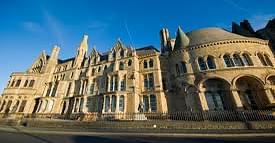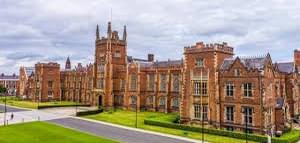Master of Arts [M.A] (Anthropology and International Relations)
Field of Study:
£19,800/Yr
Tuition Fees
| Year | 1st Year Fees |
|---|---|
| Tuition Fees | £19800 (GBP 19800) |
Your learning
The cornerstone of each course is a lecture series. Through demonstration classes and small-group work you will learn how to put economic models together, how to undertake quantitative analysis, and, potentially, formulate your own model to address a new problem. In the later parts of the programme, there is an increased emphasis on collaborative work and group presentations.
Assessment
Your progress is monitored throughout the year on a course-by-course basis, which will provide feedback aimed at improving your understanding and technique. In addition to this you will also be assessed by year-end written examinations, multiple-choice questions, and an undergraduate thesis.
Careers
Many useful skills can be gained through the study of economics, for example: finding solutions to real-world problems, mathematical skills and an enhanced understanding of contemporary political and economic events.
About one-third of our graduates move directly into graduate study, including MScs in Economics, MBA programmes and conversion courses in computing and law. Students have also proceeded to doctoral programmes including those in major US economics departments such as Columbia, Yale and Chicago.
Graduates entering employment predominantly move into management, banking and finance and the civil service.
Destinations
First destinations of recent graduates (2010-2013) of Economics programmes at UCL include:
- Graduate IT Consultant, KPMG (2013)
- Analyst, J. P. Morgan (2013)
- Full-time student, MPhil in Economics at the University of Cambridge (2013)
- Analyst, Bank of England (2013)
- Full-time student, MA in Economics at the University of British Colombia (2013)
Eligibility & Entry Requirement
Academic Requirements:
- Applicants should hold a degree with a 2:1 standard from a recognized university
- A degree certificate showing your qualifications
- Official transcripts of all the subjects that you have studied and marks achieved
- CV
- A personal statement
- Personal Reference
English Language Requirements:
- IELTS: minimum 6.5 overall with listening-5.5; reading- 6.0; speaking- 5.5; writing- 6.0
- TOEFL iBT: minimum 90 overall with listening: 17; Reading: 21; Speaking: 20; Writing: 21
- PTE Academic: minimum 62 overall with Listening: 59; Reading: 59; Speaking:59; Writing: 59
Indian Student Specific Requirement:
- A score of 60-80% from a well ranked public institution which is comparable to UK 2:1


Do you think the Rankings are wrong ? Report Here
TOP Scholarships
| Scholarship name | Award amount | Eligibility |
|---|---|---|
| - | - | - |
| - | - | - |
| - | - | - |
Key Resources for Your Study Abroad Journey
Course Guides
Masters (MS) in UK: Top Universities, Fees, Requirements & Deadlines
Study MA in UK: Top Universities, Admissions, Fees, Scholarships, Jobs
Scholarship Grants & Financial Aids
| Name | Scholarship Per Student | Level of Study | Type | |
|---|---|---|---|---|
| 1st Formations Business Scholarship | Scholarship per student£ 800/Yr$800 | Level Of StudyBachelor | TypeMerit-Based | |
| (ISC)² Women’s Cybersecurity Scholarships | Scholarship per studentVariable Amount | Level Of StudyBachelor | TypeMerit-Based | |
| Collegedunia $150 Scholarship Program | Scholarship per student£ 150/Yr$150 | Level Of StudyBachelor | TypeMerit-Based | |
| Deutschland Stipendium Program | Scholarship per student£ 4,363/Yr$4,363 | Level Of StudyBachelor | TypeCollege-Specific | |
| Paul Foundation scholarships | Scholarship per student£ 20,174/Yr$20,174 | Level Of StudyDiploma | TypeMerit-Based | |
| Goa Education Trust Scholarships | Scholarship per studentVariable Amount | Level Of StudyMaster | TypeMerit-Based |
Similar Programs
| Program | Important Date | Total Fees | Median Exams Score | Action |
|---|---|---|---|---|
-- | GBP 25,100/Yr GBP 25,100 /Yr |
|
Do you think the Dates are wrong ? Report Here
Similar Colleges


Robert Gordon University


Aberystwyth University


University of Bath


Cranfield University


Queen's University Belfast


Ulster University


University of Reading


Aston University




























Comments